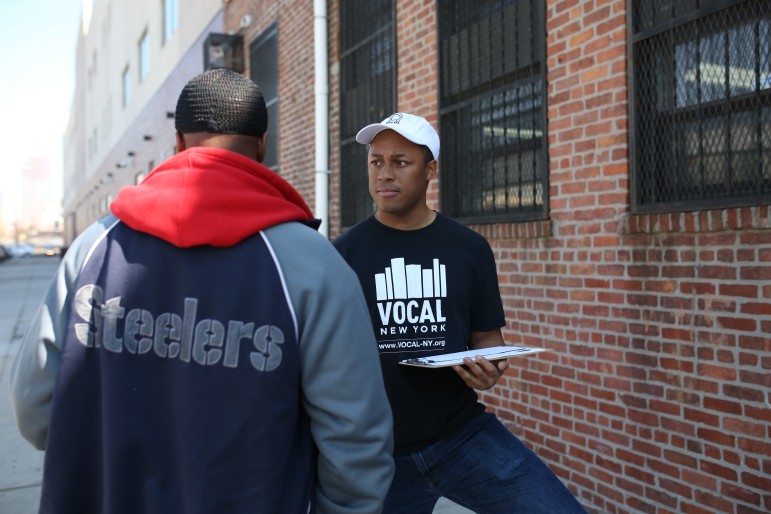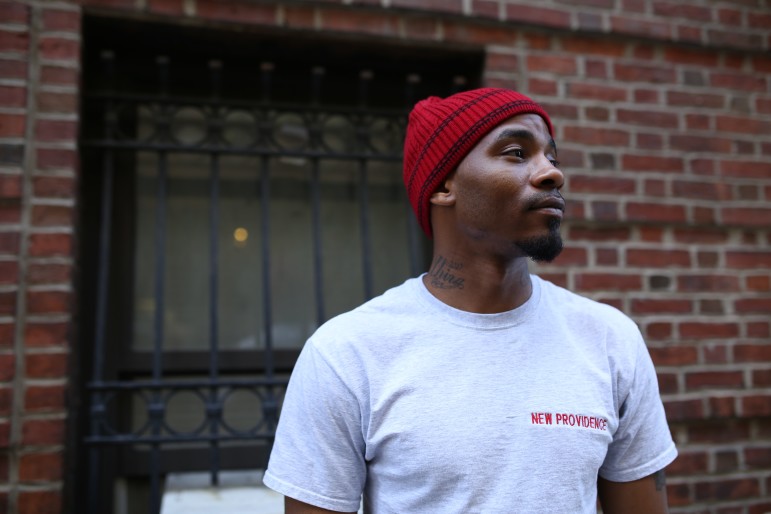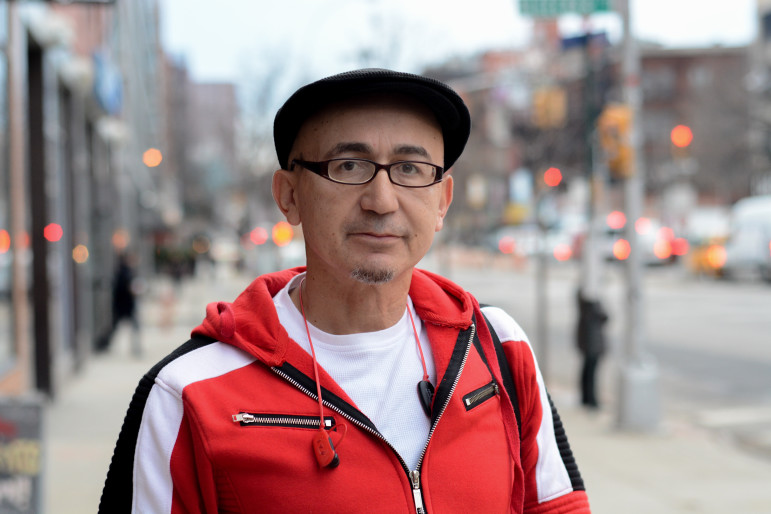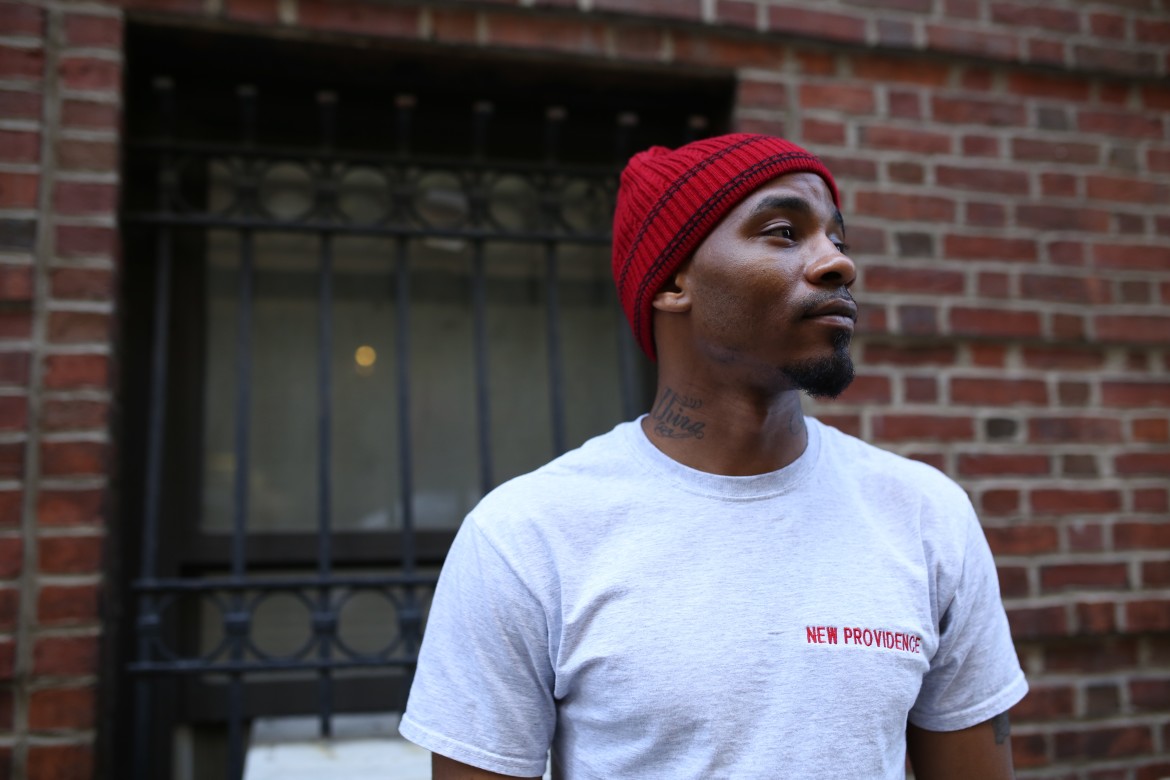
Sarah Mortimer
Brandon Holmes, a civil rights organizer at VOCAL-NY, canvassing.
NEW YORK — Marilyn Reyes-Scales, 53, remembers family time in her parents’ living room as a small child, when her aunt and uncles sat with her parents, discussing the views of political candidates and debating each one’s merits. Her parents had moved from Puerto Rico to New York for the opportunity to have a better life, and they took voting seriously.
She laughs, remembering how hard it was to sit still in one place while her parents lined up at the polls, and how heated those family conversations got. When she was old enough she joined her parents, viewing voting as both her right and her responsibility.
“It made me feel like an adult,” she said. “I felt like I was doing an adult thing.”
She st opped voting when she got involved with drugs, and in her early 30s, Reyes-Scales was convicted of a felony and incarcerated. When she got out, she knew she wanted to live a different life.
opped voting when she got involved with drugs, and in her early 30s, Reyes-Scales was convicted of a felony and incarcerated. When she got out, she knew she wanted to live a different life.
And that also meant having a say in the leadership of her community and country — by voting.
But she says for years she couldn’t register because she was on parole, and then, even after she completed it, had her registration rejected — an issue that many would-be voters have faced, likely due to misinformed election officials. This is a problem experts call "de facto disenfranchisement," meaning that people don’t vote because they are misinformed about their rights.
“I was discouraged,” she said. “I felt less worthy. I felt that because of my past, now I can’t get my life back.”
Though New York is often thought of as a bastion of progressive thinking and policies, in the juvenile justice sphere the state is middle-of-the-road in many ways. New York tries 16- and 17-year-olds as adults, meaning that juveniles can lose the right to vote before they’ve even gained it. Activists see this as one of several ways in which youth are affected by felony disenfranchisement, and are fighting for more progressive legislation.
“By restoring the right to vote, men and women are going to be able to get re-engaged in their communities,” said Brandon Holmes, a civil rights organizer at VOCAL-NY, an organization focused on empowering marginalized communities and ending mass incarceration.
Reyes-Sca les was determined to overcome the barriers that prevented her from reclaiming her rights as a citizen. She stopped using drugs, and tried hard to find work and reintegrate into her community. Eventually, her persistence paid off.
les was determined to overcome the barriers that prevented her from reclaiming her rights as a citizen. She stopped using drugs, and tried hard to find work and reintegrate into her community. Eventually, her persistence paid off.
“I wanted to do something different this time, I didn’t want to fall back,” she said. “I kept fighting.
And she says that, with this persistence — including continuing to become educated about her rights and trying to register to vote — she’s accomplished a lot.
“I got my voting rights; I helped pass the Fair Chance Act in NYC; I’ve become active in my community.” (The Fair Chance Act makes it illegal for New York employers to ask about the criminal record of job applicants before making a job offer.)
Legacy of disenfranchisement
Shortly after slavery was abolished in 1865, a move that theoretically allowed African-American men to begin to gain voting rights, a slew of new laws across the country disenfranchised those with criminal convictions.
That legacy continues today. According to the New York Civil Liberties Union, one out of every 24 black voters in New York have had their voting rights restricted, as compared to one out of every 121 voters in the state. The African-American population makes up 65 percent of the disenfranchised population, even though they make up only 13 percent of New York’s population of those old enough to vote.

Sarah Mortimer
Akiel Williams, released from incarceration with a five-year parole, has struggled with re-entry, including finding work.
“There’s a real tie between the origins of these laws and the effort to keep African-Americans out of the ballot,” said Tomas Lopez, counsel for the Democracy Program at the Brennan Center for Justice at New York University School of Law.
Across the country, voting rights for those who have been convicted of felonies are a patchwork, with some states taking rights away for life, and others allowing even those in prison to vote. New York state rests in the middle: While incarcerated and on parole, citizens are not allowed to vote, but once the sentence is completed, including for those on probation, rights are restored.
Re-entry and public safety
Akiel Williams, 25, was incarcerated as an 18-year-old, and released at 24 with a five-year parole. More fortunate than many others in similar situations, he lives with his parents who bought a house in a new neighborhood, removing him from a group of people who had negatively influenced him. Despite his relative luck he still struggled with the basics, including finding work. He eventually landed a job as a janitor (“It’s not my dream job, but it’s a start,” he said).
Proponents of lifted voting restrictions say that for people in positions similar to Williams’, voting can be a straightforward way to integrate back into society because it gives them the chance to feel as though they have worth and a say in what happens within their community. Because Williams is still on parole, he doesn’t have this opportunity, and thinks that his community is mistaken to devalue individuals’ voices.
“I would like my vote to count, I would like everybody’s vote to count,” Williams said. “I don’t think you should be limited because you had a felony.”
At its root, the justice system is meant to reform those who have committed crimes and then to send them back into their communities where they have a second chance. Experts point to civic engagement as essential in this re-entry process, and say that voting is one easy way to support this.
[Related: Many Ex-Felons Don’t Know They Can Get Their Right to Vote Restored]
“When I go and vote I feel like I’m going to be part of something,” Reyes-Scales said. “You’re doing something that’s for the good of the community. You’re exercising your rights.”
VOCAL-NY is on the steering committee of a campaign called Restore the Vote New York, which is working to expand the voting rights of those who have criminal histories, including giving anyone who is back in the community the right to vote.
One of their goals is establishing a system in which it’s mandatory for people to be offered the opportunity to register when they are released from prison, in the same way that people are when applying for a driver’s license. Holmes says that not only is this an essential part of allowing people to rehabilitate and live successfully, but that it is also important to the larger community.
“It would be tremendous for public safety, he said. “The research says that restoring the right to vote can lower recidivism rates — that right there means less crime.”
A culture of voting, a cycle of disenfranchisement
For Reyes-Scales, the idea of voting was ingrained because her parents had voted throughout her childhood. So it was natural for her to register as soon as she could — both for the first time as an 18-year-old and again once she had her rights restored. Today she has six children, five of whom are old enough to vote. Though she has talked to them about the importance of civic engagement, none of them vote.
Experts say voting is a learned behavior, and that children who grow up in communities where voting is valued are more likely to vote themselves. Even though Reyes-Scales talks to her children, the early messages that they got when their mother wasn’t able to register may have impacted them, the so-called “collateral damage” of having parents and community members who have lost rights.

Gwen McClure
Andre Centeno leaves his office in downtown Manhattan, where he works as an independent living specialist, helping people who are homeless find housing.
Holmes, from VOCAL-NY, has experienced this first-hand.
“My father is formerly incarcerated, and if I had grown up in a different neighborhood under different circumstances I never would have voted because I’d have thought ‘Oh, my voice doesn’t matter,’” he said.
Beyond the message that this sends to parents and how that affects their children, removing these votes means that communities that are more impacted by higher rates of incarceration have fewer votes, and some say this likely leads to more incarceration.
“It affects communities as a whole, as we know the youth are the backbone of our communities and it’s stripping that political power away from their parents,” Holmes said. “The men or women come back to those communities and those are votes that the community does not get back.”
Reyes-Scales says she wants to vote on issues and for people who will impact services in her community, as she sees too many children out on the streets with no after-school programs to occupy their time.
“I see that we get less. We don’t have after-school programs; we don’t get anything, because we don’t have that vote,” she said.
De facto disenfranchisement
Even for those who do have the vote, there is often confusion. As a 17-year-old, Andre Centeno, now 55, was convicted of a felony and incarcerated. He stayed in prison until he was 33, and then spent another 16 years on parole. He hadn’t even gained the right to vote before it was taken away from him, and he remembers hearing from prison guards that his voice was worthless.
“It’s sort of like an indoctrination once you go in. They tell you once you’re convicted of a felony you’ll never get to vote,” he said. “Because the last 10, 15, 20 years all you’ve heard was ‘You won’t be able to vote, you won’t be able to vote,’ now that you have the actual opportunity to vote, you don’t see the value in it.”
While Andre was incarcerated he began a college education, and now holds a master’s degree. He credits this education for a lot of his knowledge. He learned along the way that what the guards had told him was untrue, but has talked to others through his work who have gone years without knowing their rights.
“You see guys sitting there mesmerized, like ‘I wish I would have known this 20 years ago’” he said.
In a study done by the American Civil Liberties Union and Brennan Center for Justice, election officials were questioned about the rights of voters who had completed their sentences, and overwhelmingly responded with misinformation. There was confusion over the difference between parole and probation, over how misdemeanors affected voting rights (usually, not at all) and about basic registration procedures. All this has a direct impact on potential voters, who often have limited access to information and won’t attempt to register again.
For Reyes-Scales, her persistence meant that eventually she found out that she was indeed allowed to vote, and was able to successfully register.
For others, they may stumble across the information, or they may never find out their rights.
Williams, the 25-year-old who works as a janitor, explained that even when he finished parole he still wouldn’t have the right to vote, due to his previous conviction, information he’d heard from a number of people, passed to him as common knowledge. When I told him that, in fact, he can vote in four years when he finishes probation, his tone shifted.
“I’m feeling good,” he said. “You gave me hope.”
This article has been updated.
More related articles:
Juveniles, Their Advocates Unhappy with Lack of Re-entry Resources from LA Probation

Hi, it’s Andre (Trigo). It’s people like Gwen that me believe things can be different. Thanks for this article and for your courage to “Say Something”,
I Remain,
Andre
Please keep trying!!
I did 15 years in prison on an A1 Drug Conviction and 4 years on Parole. I worked for NYC and the GOVERNMENT before I went to jail. I registered when released from parole to vote and was granted the right to vote. I vote on every election Now including Obama twice! We need our voting rights back! Keep trying.
This is not about race. If you aren’t willing to follow the law yourself, then you can’t demand a role in making the law for everyone else, which is what you do when you vote. The right to vote can be restored to felons, but it should be done carefully, on a case-by-case basis after a person has shown that he or she has really turned over a new leaf, not automatically on the day someone walks out of prison. After all, the unfortunate truth is that most people who walk out of prison will be walking back in. Read more about this issue on our website here [ http://www.ceousa.org/voting/voting-news/felon-voting/538-answering-the-challenges-to-felon-disenfranchisement ] and our congressional testimony here: [ http://judiciary.house.gov/_files/hearings/pdf/Clegg100316.pdf ].